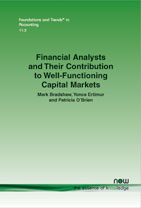Financial Analysts and Their Contribution to Well-Functioning Capital Markets
Mark Bradshaw, Boston College, USA, mark.bradshaw@bc.edu , Yonca Ertimur, University of Colorado, USA, yonca.ertimur@ertimur.net , Patricia O'Brien, University of Waterloo, Canada, pobrien@uwaterloo.caAbstract
Well-functioning capital markets rely on a complex set of institutions and participants that ensure capital is allocated to its best possible use, and that information flows between firms receiving capital and the investors who provide it. In this manuscript, we endeavor to understand whether, how, and under what circumstances sell-side research contributes to the functioning of capital markets. We review major findings in the literature, address significant regulatory and technological changes, and offer suggestions for future research.
Financial Analysts and Their Contribution to Well-Functioning Capital Markets
Financial Analysts and Their Contribution to Well-Functioning Capital Markets views analysts in their role as key capital market intermediaries. The primary focus is on analysts' activities, the information that is important to them, who benefits from their activities, and how regulation and information technology have changed their environment in recent years. The authors question the restrictive focus on analysts' quantitative outputs that characterizes some prior research, and instead focus on the information environment, the constituents that analysts serve, and their contribution to well-functioning capital markets. Within this broader perspective, opportunities are identified to advance the academic literature on financial analysts' activities and contributions. Section 2 gives a recent historical overview of analysts' institutional setting. Section 3 discusses the basics of a career in sell-side research. Section 4 highlights the sources of information available to analysts. Sections 5 and 6 discuss the nature of the information analysts generate and how this information is useful to the capital markets, respectively. Section 7 critically assesses how research characterizes analysts' conflicts of interest. Section 8 discusses the pitfalls of using regulations as "natural experiments," as is common in accounting and finance research. Section 9 considers Reg FD as a case study of research inference. Section 10 briefly highlights evidence of analysts' value in capital markets and Section 11 concludes.

Erratum for References
Commentary submitted by: Daniel Bradley and Mark Bradshaw. Date Accepted: 30 January 2018.
- Description: On page 130, in the 7th paragraph of section 3, the citation to Bradley et al. should read 2017 instead of 2016. The revised full reference of this citation is: Bradley, D., Gokkaya, S. and Liu, X., 2017. Before an analyst becomes an analyst: Does industry experience matter? The Journal of Finance. 72(2): 751-792.
Commentary submitted by: Patricia O'Brien. Date Accepted: 13 September 2018.
- Description: The citation of Chen et al. 2010 in Ch 9 on p. 170 is a citation of the following reference: Z. Chen, D. Dhaliwal, and H. Xie. Regulation fair disclosure and cost of equity capital. Review of Accounting Studies, 15:106-144, 2010.